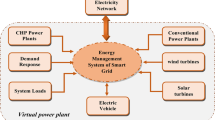Abstract
The needs of human communities for electrical energy is increasing every day, and as a result, the price of fossil fuels is steadily increasing. Considering the trend of advances in renewable energy technologies and the support of governments and energy policymakers to make more use of these clean and inexpensive resources. Limitations such as low capacity, the uncertainty of output power and stability issues have made it costly and difficult to use Distributed Energy Resources (DERs). To solve these problems, a new concept known as Virtual Power Plant (VPP) has been proposed to facilitate the exploitation of DERs. The VPP is a set of DERs that are put together for market participation. Also, efforts to reduce the amount of environmental pollution have replaced the use of Electric Vehicles (EV) instead of internal combustion engines. Regarding this paper, a new model for optimizing virtual power plant is presented. In this model, the Demand response (DR) has been used, whose modeling is based on Price-Based Demand Response for ordinary loads and incentive. To solve the problem a mixed integer linear programming model is proposed to maximize the profit of the virtual power plant. In order to see the effectiveness and satisfying performance of proposed model, a case study including DERs, EV, and loads is studied as test system. The simulation results using Matlab and GAMS show the efficiency of the proposed model and proves that simultaneous use of the price-based demand response program, smart charging, and the participation of electric vehicles in demand responses reduces operating costs.










Similar content being viewed by others
References
Jua L, Tana Q, Lub Y, Tana Z, Zhanga Y, Tana Q (2019) A CVaR-robust-based multi objective optimization model and three-stage solution algorithm for a virtual power plant considering uncertainties and carbon emission allowances. Electr Power Energy Syst 107:628–643
Xiao J, Kong X, Jin Q, You H, Cui K, Zhang Y (2018) Demand—response virtual power plant optimization scheduling method based on competitive bidding equilibrium. EnergyProcedia 152:1158–1163
Liua Y, Lia M, Liana H, Tanga X, Liua C, Jiangb C (2018) Optimal dispatch of virtual power plant using interval and deterministic combined optimization. Electr Power Energy Syst 102:235–244
Songyuan Yu, Fang F, Liu Y, Liu J (2019) Uncertainties of virtual power plant: Problems and countermeasures. Appl Energy 239:454–470
Kasaei MJ, Gandomkar M, Nikoukar J (2017) Optimal operational scheduling of renewable energy sources using teaching-learning based optimization algorithm by virtual power plant. J Energy Resour Technol 139:062003-062003–8
Kim S, Kwon W, Kim H, Jung K, Kim G, Shim T, Lee D (2019) Offer curve generation for the energy storage system as a member of the virtual power plant in the day-ahead market. J Electr Eng Technol 14:2277–2287
Kasaei MJ, Gandomkar M, Nikoukar J (2017) Optimal management of renewable energy sources by virtual power plant. Renew Energy 114:1180–1188
Zhou B, Zhang K, Chan KW, Li C, Xi L, Siqi B, Gao X (2020) Optimal coordination of electric vehicles for virtual power plants with dynamic communication spectrum allocation. IEEE Trans Ind Inf 17:450–462
Gough R, Dickerson C, Rowley P, Walsh C (2017) Vehicle-to-grid feasibility: a techno-economic analysis of EV-based energy storage. Appl Energy 192:12–23
Arslan O, Karasan OE (2013) Cost and emission impacts of virtual power plant formation in plug-in hybrid electric vehicle penetrated networks. Energy 60:116–124
Abbasia MH, Takia M, Rajabib A, Lib L, Zhangb J (2019) Coordinated operation of electric vehicle charging and wind power generation as a virtual power plant: a multi-stage risk constrained approach. Appl Energy 239:1294–1307
Chukwu UC, Mahajan SM (2014) Real-time management of power systems with V2G facility for smart-grid applications. Sustain Energy IEEE Trans 5(2):558–566
Seddig K, Jochem P, Fichtner W (2019) Two-stage stochastic optimization for cost-minimal charging of electric vehicles at public charging stations with photovoltaics. Appl Energy 242:769–781
Qu Z, Song J, Liu Y, Lv H et al (2019) Optimization model of EV charging and discharging price considering vehicle owner response and power grid cost. J Electr Eng Technol 14:2251–2261
Salehpour MJ, Moghaddas Tafreshi SM (2020) Contract-based utilization of plug-in electric vehicle batteries for day-ahead optimal operation of a smart micro-grid. J Energy Storage 27:101157
Bhargavi KM, Jayalakshim NS (2019) A new control strategy for plug-in electric vehicle of DC microgrid with PV and wind power integration. J Electr Eng Technol 14:13–25
Vahedipour Dahraiea M, Rashidizadeh Kermania H, Anvari Moghaddam A (2020) Scheduling of virtual power plants considering demand response and uncertainties. Int J Electr Power Energy Syst 121:106126
Gutierrez V, Zamora E et al (2019) Optimal dispatch model for demand response aggregators. J Electr Eng Technol 14:85–96
Nojavan S, Zare K, Mohammadi-Ivatloo B (2017) Optimal stochastic energy management of retailer based on selling price determination under smart grid environment in the presence of demand response program. Appl Energy 187:449–464
Stimoniarisa D, Kottasa T, Orthb C, Soaresc F, Madureirac A, Leonardosd D, Panagiotoue S, Chountalae CH (2019) Digital Audio Broadcasting (DAB)-based demand response for buildings, electric vehicles and prosumers (DAB-DSM). Energy Procedia 159:527–532
Rassaei F, Soh W-S, Chua K-C (2016) Distributed scalable autonomous market-based demand response via residential plug-in electric vehicles in smart grids. IEEE Trans Smart Grid 9:3281–3290
Nezamoddini N, Wang Y (2016) Risk management and participation planning of electric vehicles in smart grids for demand response. Energy 116:836–850
O’Connell A, Flynn D, Keane A (2014) Rolling multi-period optimization to control electric vehicle charging in distribution networks. Power Syst IEEE Trans 29:340–348
Shaaban MF, Ismail M, El-Saadany EF, Zhuang W (2014) Real-time pev charging/discharging coordination in smart distribution systems. Smart Grid IEEE Trans 5(4):1797–1807
Saber AY, Venayagamoorthy GK (2011) Plug-in vehicles and renewable energy sources for cost and emission reductions. Ind Electron IEEE Trans 58(4):1229–1238
Faria, P (2011) Demand Response in future power systems management—A conceptual framework and simulation tool, Master degree thesis, School of Engineering—Polytechnic of Porto, Portugal
Wang Y, Ai X, Yan L, Liu S (2016) Interactive dispatch modes and bidding strategy of multiple virtual power plants based on demand response and game theory. IEEE Trans Smart Gride 7:510–516
Sousa T, Morais H, Soares J, Vale Z (2012) Day-ahead resource scheduling in smart grids considering Vehicle-to-Grid and network constraints. Appl Energy 96:183–193
Rabiee A, Sadeghi M, Aghaeic J, Heidari A (2016) Optimal operation of microgrids through simultaneous scheduling of electrical vehicles and responsive loads considering wind and PV units uncertainties. Renew Sustain Energy Rev 57:721–739
Author information
Authors and Affiliations
Corresponding author
Additional information
Publisher's Note
Springer Nature remains neutral with regard to jurisdictional claims in published maps and institutional affiliations.
Rights and permissions
About this article
Cite this article
Heydari, R., Nikoukar, J. & Gandomkar, M. Optimal Operation of Virtual Power Plant with Considering the Demand Response and Electric Vehicles. J. Electr. Eng. Technol. 16, 2407–2419 (2021). https://doi.org/10.1007/s42835-021-00784-8
Received:
Revised:
Accepted:
Published:
Issue Date:
DOI: https://doi.org/10.1007/s42835-021-00784-8




